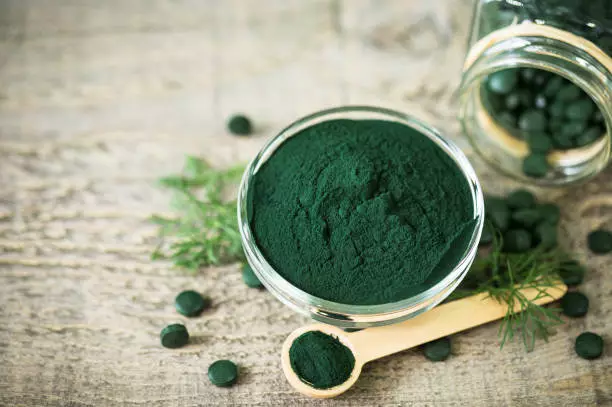Spirulina, that mysterious superfood everyone’s talking about, has become an essential dietary companion for many. Increasingly popular thanks to its incredible health benefits, this natural supplement is attracting growing interest.
Origins and definition
Spirulina is a cyanobacterium, commonly known as blue-green algae, which grows in freshwater. It takes its name from its characteristic spiral shape and has been consumed for centuries by various civilisations for its nutritional benefits. Compared with synthetic supplements, it is 100% natural and contains a high concentration of nutrients.
The essential nutrients contained in spirulina
What really sets spirulina apart is its wealth of vital nutrients. Here are some of the key components present in this algae:
- Protein: Spirulina contains between 55% and 70% protein, depending on the species and cultivation method. It is an ideal vegetarian and vegan alternative, particularly for athletes.
- Vitamins: Spirulina is rich in beta-carotene (a precursor of vitamin A), vitamin B12 (essential for vegetarians who are often deficient in this vitamin) and vitamin E, known for its antioxidant properties.
- Minerals: Spirulina also contains important minerals such as iron, magnesium, calcium and potassium. The iron contained in spirulina is particularly well assimilated by the body.
- Antioxidants: As well as vitamins, spirulina is rich in phycocyanin and other pigments that act as powerful antioxidants.
How it supports the immune system
One of spirulina’s major virtues is its ability to boost the immune system. Its high nutritional composition stimulates the production and activity of the cells responsible for immune defence. The various antioxidant compounds present help to protect the body against free radicals, thereby reducing the risk of infections.
Effects of spirulina on sports performance
Thanks to its abundant proteins and various essential micronutrients, it enables athletes and sports enthusiasts to recover more effectively after training. It helps increase muscle resistance, reduces fatigue and improves overall physical performance. Its anti-inflammatory properties also help to minimise post-training aches and pains.
Antioxidant properties of spirulina
It has exceptional antioxidant properties. They come from a number of substances such as phycocyanin, a blue pigment, and beta-carotene, a precursor of vitamin A. These components play a crucial role in combating oxidative stress by neutralising free radicals, thereby delaying cell ageing and promoting better overall health.
Practical everyday
It can be incorporated into your daily diet in a variety of ways. Here are a few suggestions:
- Powdered supplement: Easy to add to your smoothies, fruit juices or even soups.
- Tablets: For those who prefer a controlled intake with no particular taste, tablets offer a convenient way to consume spirulina.
- Capsules: Similar to tablets, they are easy and quick to absorb.
Medical advice and recommendations
Although spirulina is generally considered safe for most people, certain precautions should be taken. Pregnant women, people suffering from autoimmune diseases or those with thyroid problems should consult their doctor before including spirulina in their diet. For most people, however, spirulina is an excellent nutritional supplement with few side effects.
Comparison with other superfoods
Spirulina is often compared with other superfoods such as chlorella, moringa or kale. While chlorella is renowned for its detoxifying properties, spirulina excels for its protein content. Compared with moringa, spirulina offers a more concentrated source of certain vitamins and minerals. Finally, although kale is an excellent source of vitamins K and C, it does not rival spirulina’s overall nutritional density.
In short, spirulina, with its multiple health benefits and rich nutrient content, is an essential dietary supplement. Whether you’re an athlete, vegetarian or simply health-conscious, incorporating it into your diet could prove extremely beneficial.





